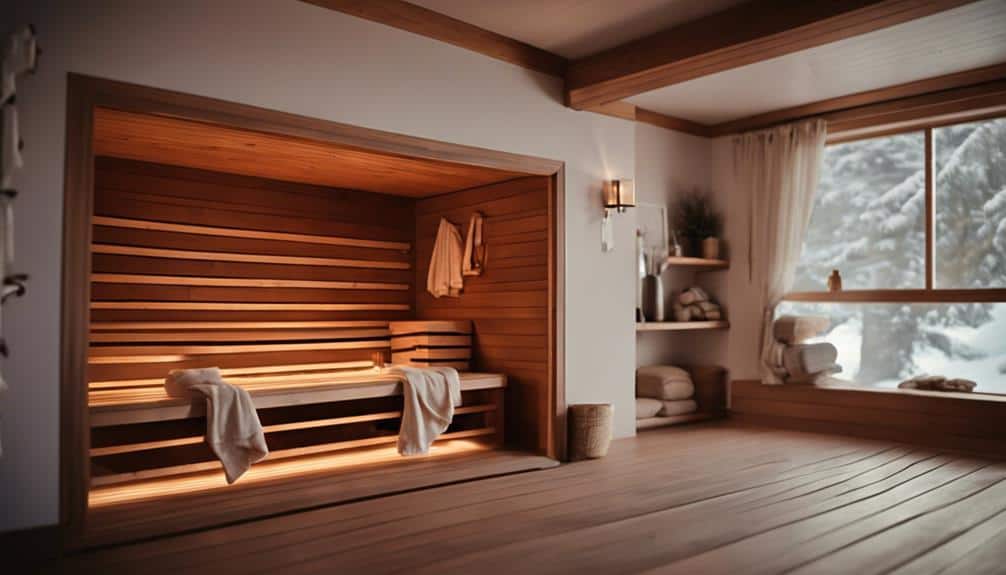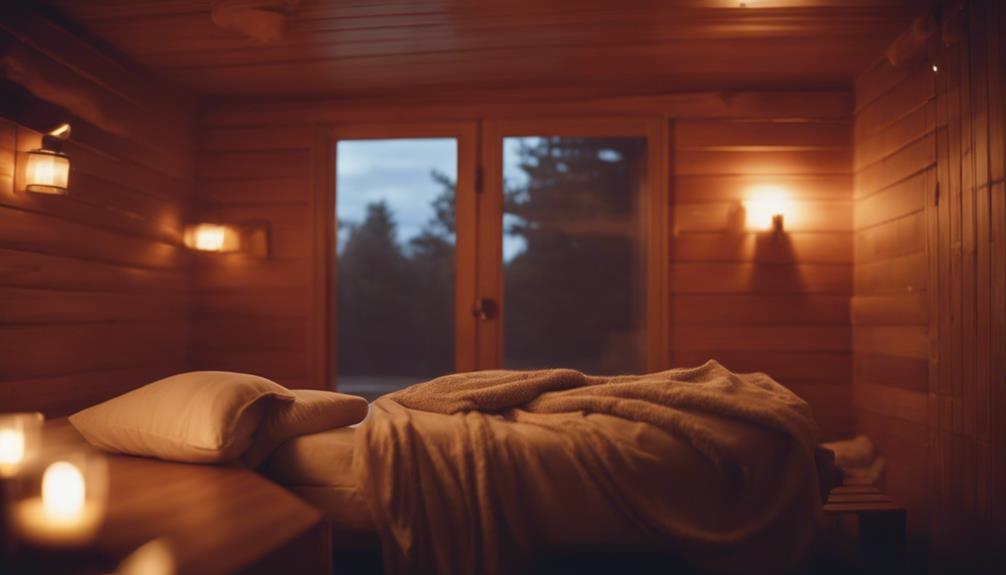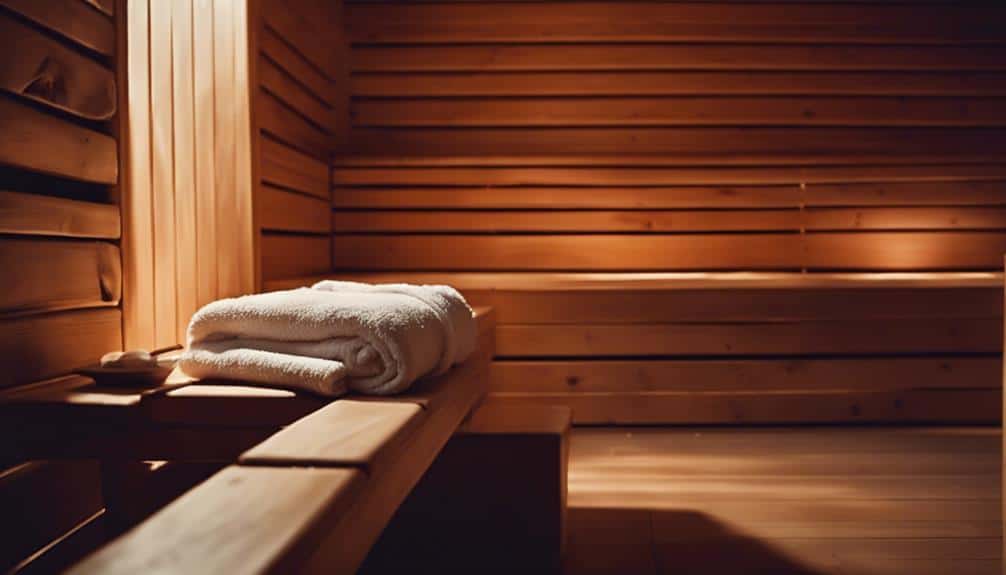How to Improve Sleep Patterns With Sauna Use
I've always been fascinated by the power of contrasts, and when it comes to sleep patterns, it seems like the answer to a good night's rest could be found in the heat of a sauna.
Yes, you heard that right. Sauna use has been shown to have a positive impact on sleep quality, but how exactly does it work? Well, I'm here to unravel the mystery and share some tips on how to optimize your sauna sessions for better sleep.
So, if you've ever struggled with getting a good night's sleep, keep reading because the answer might just lie in the steamy depths of a sauna.
Key Takeaways
- Sauna therapy promotes muscle relaxation and deep sleep, aiding in better sleep patterns.
- Infrared saunas stimulate melatonin production, improving sleep quality.
- Regular sauna sessions before bedtime enhance sleep duration and quality.
- Gradually increasing sauna time and maintaining optimal sauna temperature can optimize sleep effects.
Benefits of Sauna for Sleep
Sauna therapy has been shown to provide numerous benefits for improving sleep patterns. The heat and steam in a sauna help to raise your body temperature, which leads to muscle relaxation. When your muscles are relaxed, it becomes easier to fall asleep and stay asleep. Additionally, saunas can promote deep sleep, which is essential for rejuvenation and overall well-being.
Infrared saunas, in particular, have positive effects on sleep. They use infrared radiation to release heat, which penetrates deeper into the body. This deep heat helps to release tension in the muscles, aiding in relaxation and promoting a better quality of sleep. The infrared sauna also helps to increase blood circulation, which can contribute to a more restful sleep.
Using a sauna before bedtime can have long-lasting benefits for your sleep. It offers a natural alternative to prescription sleep aids, allowing you to avoid potential side effects. Saunas also help combat stress, caffeine effects, and hormonal fluctuations, all of which can disrupt sleep patterns.
Choosing the Right Sauna for Better Sleep

To optimize the benefits of sauna therapy for better sleep, it's important to carefully consider the type of sauna that best suits your heat preferences and desired sleep outcomes.
Here are three key factors to consider when choosing the right sauna for better sleep:
- Sauna Type: Consider using an infrared sauna for deeper heat penetration and gentle heat exposure. Infrared saunas use red light to stimulate melatonin production, aiding in better sleep quality. On the other hand, traditional saunas provide higher temperatures, which may suit individuals preferring intense heat.
- Heat Intensity: Choose a sauna type based on your comfort level with heat intensity. If you enjoy and benefit from intense heat, a traditional sauna may be the right choice for you. If you prefer a milder and more gentle heat, an infrared sauna would be a better option.
- Desired Sleep Benefits: Different sauna types have varying impacts on sleep patterns. If you want to improve melatonin production and enhance sleep quality, an infrared sauna is recommended. However, if your primary goal is to relax and unwind before bed, either sauna type can be beneficial.
Incorporating Sauna Into Your Bedtime Routine

Incorporating regular sauna sessions into your bedtime routine has been shown to promote muscle relaxation and aid in falling asleep faster. Sauna bathing, when done before bed, can have a positive impact on sleep quality and help improve overall sleep patterns. Splitting one hour per week into two to three sauna sessions can offer general health benefits and enhance sleep quality.
To optimize the benefits of sauna use for improved sleep patterns, it's recommended to take sauna sessions 1-2 hours before bedtime. This timing allows the body to cool down effectively after the sauna, which can enhance sleep onset and quality. The deep sweating experienced during a sauna session can also help to detoxify the body and promote relaxation, making it easier to fall asleep.
In addition to sauna bathing, incorporating deep breathing exercises and practicing meditation in the sauna before bed can maximize the relaxation benefits and further improve sleep patterns. By gradually increasing sauna time based on your comfort level and listening to your body, you can optimize the effects of sauna use on your sleep.
Sauna Temperature and Sleep Quality

By understanding the relationship between sauna temperature and sleep quality, individuals can optimize their sauna sessions to enhance their overall sleep patterns. The temperature in the sauna plays a crucial role in regulating body temperature and promoting better sleep. Here's how:
- Internal Body Temperature: Sauna sessions at optimal temperatures can increase internal body temperature. This rise in temperature helps improve deep sleep quality, allowing individuals to experience more restorative and rejuvenating sleep.
- Core Temperature Regulation: Maintaining a consistent sauna temperature helps regulate core body temperature, which is essential for a good night's sleep. By keeping the body's core temperature stable, individuals can enjoy longer and undisturbed sleep, without fluctuations that may disrupt sleep patterns.
- Cooling Down Effect: Gradual cooling down after a sauna session is crucial for sleep quality. This process triggers the release of sleep-inducing hormones, such as melatonin, which aid in sleep patterns. Cooling down gradually allows the body to transition from the heightened temperature of the sauna to a cooler environment, signaling the body that it's time to sleep.
In addition to body temperature regulation, the sauna's impact on skin temperature and body heat distribution also contribute to better sleep efficiency. Understanding and managing sauna temperature can significantly improve sleep quality and overall sleep patterns.
Sauna Duration and Sleep Improvement

Sauna duration plays a significant role in improving sleep quality and promoting better sleep patterns. Increased time spent in a sauna bath can have a positive impact on our overall health and sleep. Heat exposure during a sauna session helps to relax the body and reduce muscle tension, making it easier to fall asleep.
Studies have shown that regular sauna use for 2-3 times per week is associated with better sleep patterns. In particular, sauna sessions of 15-20 minutes before bedtime have been found to significantly improve sleep quality. Additionally, having an evening sauna session 1-2 hours before sleep onset can enhance sleep duration.
For those looking to fall asleep faster and stay asleep longer, a sauna duration of 30 minutes before bed can be beneficial. Consistent sauna use before bedtime can also help regulate core body temperature, which is important for maintaining good sleep patterns. So, if you're struggling with sleep, consider incorporating regular sauna baths into your routine for improved sleep quality and overall health.
Precautions and Considerations for Sauna Use

Before using a sauna, it's important to consider precautions and potential risks to ensure a safe and beneficial experience. Here are some key considerations to keep in mind:
- Consult a healthcare provider: If you have any underlying health conditions or concerns, it's important to consult with a healthcare provider before using a sauna. They can provide guidance on whether sauna use is appropriate for you and any precautions you should take.
- Stay hydrated: Sauna sessions can cause significant sweating, leading to dehydration. It's important to drink plenty of water before and after using a sauna to stay properly hydrated. This will help prevent dizziness, fatigue, and other potential adverse effects.
- Limit sauna sessions: While sauna use can have positive effects on sleep, it's important to limit the duration of your sessions. Spending too many hours in high temperatures can lead to overheating and discomfort. It's recommended to start with shorter sessions of around 10-15 minutes and gradually increase the duration as your body becomes accustomed to the heat.
Frequently Asked Questions
Do Saunas Help You Sleep Better?
Saunas can greatly improve sleep quality by providing relaxation, reducing stress, and promoting muscle relaxation. They serve as natural sleep aids, helping with sleep disorders, sleep deprivation, and maintaining a healthy circadian rhythm.
Does Sauna Increase Melatonin?
Yes, sauna use increases melatonin production, promoting relaxation and better sleep. Saunas impact circadian rhythm, making it a natural sleep aid. The heat stimulates the body to release melatonin, improving sleep quality and promoting deep sleep.
Is It Good to Sauna Every Night?
It is good to sauna every night as it can have numerous benefits for overall health. Sauna promotes relaxation, relieves stress, and can establish a calming bedtime routine, leading to better sleep patterns.
What Happens to Your Body When You Use a Sauna Everyday?
Using a sauna every day has numerous benefits. It improves circulation, relaxes muscles, boosts the immune system, reduces stress and anxiety, and provides pain relief. These positive effects can result in a transformative impact on the body.
Conclusion
In conclusion, incorporating sauna use into your routine can have a significant positive impact on your sleep patterns. Saunas promote relaxation, muscle tension release, and heat release through infrared radiation.
By incorporating a sauna session before bedtime, you can enhance your sleep quality naturally and improve your overall sense of well-being. Remember to choose the right sauna, consider the temperature and duration of your sessions, and take necessary precautions for optimal sleep improvement.
Give sauna use a try and experience the benefits for yourself!







